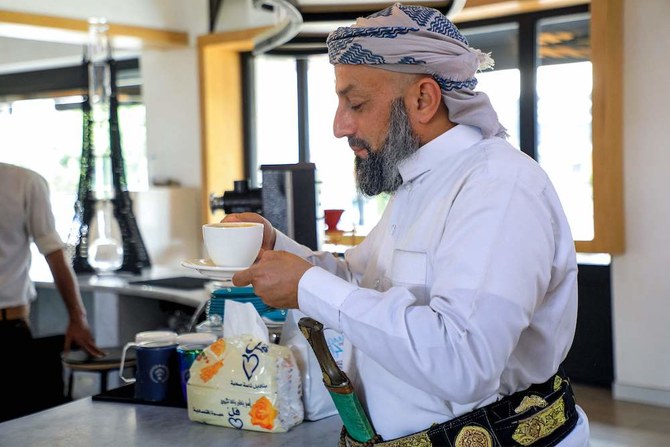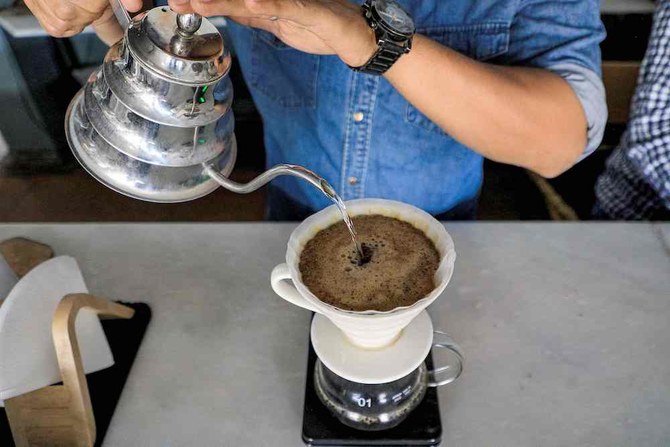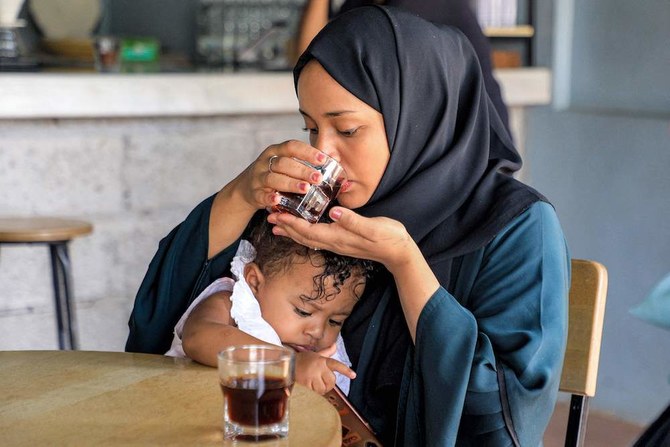SANAA: Tucked amid shell-pocked buildings and roadside tributes to fallen fighters, a less obvious byproduct of wartime is spreading across Yemen’s capital: specialty coffee houses serving steaming cups of top-rated pour-over.
The Arabian Peninsula’s most impoverished country, locked in an eight-year conflict between Iran-backed Houthi militia and forces supporting the internationally recognized government, has deep ties to coffee.
Legend has it that Sufi mystics on Yemen’s western coast were the first people to brew coffee beans back in the 15th century.
Yet Yemeni entrepreneurs have until recently focused on exporting their best product to wealthy overseas markets.
The most famous among them is Mokhtar Alkhanshali, whose death-defying bid to ship a container full of specialty beans during the war’s early stages was chronicled in Dave Eggers’ 2018 best-selling book “The Monk of Mokha.”
For other Yemenis, however, blocked ports and related restrictions imposed during the war have inspired them to turn inward, giving rise to a cafe scene that today brings flashes of Brooklyn and Paris to Sanaa’s war-scarred streets.
“People started to feel like Yemeni coffee was costing a lot and they lost interest in buying it,” said Rashed Ahmed Shagea of Durar Coffee, recalling how the export market soured as fighting broke out in 2015.
In response, he opened a cozy shop in central Sanaa where customers can sample beans from all over the country, surrounded by Yemeni art and Yemeni-made wood furniture.
“We had to think of another way to support our farmers,” Shagea said.
“Everybody said it’s impossible to work in Yemen, that people had no purchasing power... But we insisted.”
In southern Sanaa’s Hadda neighborhood, Hussein Ahmed made a similar gamble in 2018, opening his Mocha Hunters cafe on a street dotted with million-dollar villas.
It was the culmination of a long personal journey with coffee that began when he and his Japanese wife founded a cafe in Tokyo more than a decade ago.
After the marriage ended, Ahmed also turned his attention to exporting, but wartime hurdles and a travel ban against Yemenis introduced by former US president Donald Trump spurred him to consider opportunities in his home country.
In the cafe’s early days, Ahmed could sometimes count on one hand the number of customers who dropped by.
Now the patio is full most afternoons, with Yemenis and foreigners drawn to the simple menu: 750 Yemeni rials (around $1.50) for pour-over drip and qishr, a traditional drink made from coffee husks, and 1,000 Yemeni rials (around $2) for cold brew.
“It’s like a wave,” Ahmed said, adding this was only natural for a country of coffee “pioneers” who transformed it “from seeds to a magical drink.”
The specialty offerings are a far cry from the commercial-grade coffee, often loaded with milk and sugar, that many Yemenis are used to consuming, Ahmed said.
“This movement, it reintroduces what is good taste,” he said, with a touch of the haughtiness required of any self-respecting trendsetter.
“We tell customers, ‘Your taste or preference doesn’t matter for us. We drink what we think is good.’“
Both Durar and Mocha Hunters still depend heavily on their export business, which became easier after a truce was announced in April last year.
Yemeni coffee is world-renowned: James Freeman, founder of Blue Bottle Coffee, once said of Alkhanshali’s Port of Mokha product that “this is what angels singing tastes like.”
Sales abroad have been boosted further by Yemeni diaspora communities wracked with nostalgia for their homeland but reluctant to return because of the fighting, Ahmed said.
“I think our expats, our people who live abroad, because of the hardness of travel, they become more emotional about their land. So they buy local products,” he said.
“It’s a global movement, specialty coffee, but in Yemen it’s more emotional.”
Back home, meanwhile, entrepreneurs are bullish on local consumption, especially if a durable cease-fire were to take hold and improve the economy.
More than two-thirds of the population currently depend on aid to survive.
“This place will grow in the future to become the largest coffee center in the Middle East,” predicted Ghaleb Yahya Alharazi, manager of Haraz, a coffee house that opened last year and can accommodate 1,000 people.
“We have a goal, which is a journey back to the glory, culture and authenticity of Yemeni coffee.”
Yemen specialty coffee ‘wave’ sweeps war-hit capital
https://arab.news/wbfqf
Yemen specialty coffee ‘wave’ sweeps war-hit capital

- Legend has it that Sufi mystics on Yemen’s western coast were the first people to brew coffee beans back in the 15th century
UN envoy to Syria warns ‘conflict has not ended yet’

“There have been significant hostilities in the last two weeks, before a ceasefire was brokered... A five-day ceasefire has now expired and I am seriously concerned about reports of military escalation,” said Geir Pedersen, the UN’s special envoy for Syria.
“Such an escalation could be catastrophic.”
Pedersen also said he had met with Syria’s new de facto leadership following the militants’ lightning takeover, and toured Sednaya prison’s “dungeons” and “torture and execution chambers,” operated under Assad’s government.
He called for “broad support” for Syria and an end to sanctions to allow for reconstruction of the war-ravaged country.
“Concrete movement on an inclusive political transition will be key in ensuring Syria receives the economic support it needs,” Pedersen said.
“There is a clear international willingness to engage. The needs are immense and could only be addressed with broad support, including a smooth end to sanctions, appropriate action on designations, too, and full reconstruction.”
Western countries are wrestling with their approach to Hayat Tahrir Al-Sham (HTS), which spearheaded the takeover of Damascus, and has roots in the Syrian branch of Al-Qaeda. It has largely been designated in the West as a “terrorist” group, despite moderating its rhetoric.
Hamas says Gaza truce talks in Doha ‘serious and positive’

- Reaching an agreement for a ceasefire and a prisoner exchange is possible if the occupation ceases to impose new conditions, Hamas said
DOHA: Hamas said talks in Qatar on Tuesday aimed at a truce and hostage-prisoner exchange in Gaza were “serious and positive,” a day after an Israeli delegation arrived in Doha to meet with mediators.
“Hamas affirms that, in light of the serious and positive discussions taking place today in Doha under the auspices of our Qatari and Egyptian brothers, reaching an agreement for a ceasefire and a prisoner exchange is possible if the occupation ceases to impose new conditions,” the Palestinian group said in a statement.
Israeli officials arrived in Doha on Monday for talks aimed at bridging gaps between the two parties, a source with knowledge of the discussions told AFP, speaking on condition of anonymity due to their sensitivity.
The meetings follow a trip by David Barnea, who heads Israel’s Mossad intelligence agency, to the Qatari capital on Wednesday, the source said.
Qatar, along with the United States and Egypt, has been involved in months of behind-the-scenes negotiations for a Gaza truce and hostage release.
But apart from a one-week pause in fighting late last year, during which scores of Hamas-held hostages were released in exchange for Palestinians held in Israeli jails, successive negotiations have failed to halt the war.
On Monday, Israel’s Defense Minister Israel Katz indicated Israeli negotiators have “not been this close to an agreement” for the release of hostages in Gaza since the November 2023 truce.
A senior Hamas official based in Doha also said on Monday that negotiations for a deal were “closer than ever before” but warned Israeli Prime Minister Benjamin Netanyahu could still “disrupt the agreement as he has done every time before.”
Syrians rebuild Maaret Al-Numan, symbol of war’s devastation

- Once home 100,000 people, Maaret Al-Numan was devastated by years of war
- Residents fear returning due to mines and unexploded ordinances
MAARET AL-NUMAN, Syria: Vegetation grows between crumbled walls and torn asphalt, and not a single street remains intact in Syria’s Maaret Al-Numan, a key war battleground town being brought back to life by returnees.
Bilal Al-Rihani reopened his pastry shop in the western town this week with his wife and 14-year-old son.
The 45-year-old baker couldn’t stay away after years of exile, even amid the devastation surrounding him.
Working without water or electricity, the shop bustles with customers as they prepare cinnamon pastries — a family speciality for 150 years.
Cars weave through the ruins, honking to announce their arrival. Like Rihani, his customers are former residents displaced by war, eager to rebuild their homes and lives.
“I’m doing better business here than in the (displacement) camp!” Rihani said, pointing to the cracked road outside. “This street was the town’s busiest, day and night.”
Once home to nearly 100,000 people, Maaret Al-Numan was devastated by years of war, turning it into a ghost town and a symbol of Syria’s destruction.
The town’s location on the strategic M5 highway, linking second city Aleppo to the capital Damascus, made it a key battleground from the outbreak of fighting in 2012.
Islamist rebel group Hayat Tahrir Al-Sham, the group now in power after ousting long-time president Bashar Assad over a week ago, seized it in 2017.
But in 2020, Assad’s forces backed by Russian air strikes retook the town after intense fighting, forcing the last remaining residents to flee to displacement camps in Idlib.
The war left Maaret Al-Numan littered with mines and unexploded ordinances, deterring large-scale returns.
Authorities have yet to encourage people to return, but the White Helmets, a volunteer rescue group active in rebel areas, were working to clear debris and recover bodies.
At one site, they placed four bodies in mortuary bags.
“Soldiers from Assad’s army, killed by his own people,” one White Helmet member said, declining to elaborate.
The Syrian civil war, which began in 2011 with the brutal crackdown on pro-democracy protests, resulted in more than half a million deaths and displaced millions of people.
At another intersection, a bulldozer clears collapsed stone walls from the streets.
“This neighborhood is cleaned up, and we’re here to protect the people and their belongings,” said Jihad Shahin, a 50-year-old police officer.
“Activity is returning to the city, and we’ll rebuild better than before.”
But it is an uphill battle, according to local official Kifah Jaafer.
“There are no schools, no basic services. We’re doing what we can to help, but the city lacks everything,” he said.
Jaafer, who previously managed an Idlib displacement camp, is now focused on addressing residents’ needs as they trickle back.
At the town’s edge, Ihab Al-Sayid, 30, and his brothers are clearing the collapsed roof of their family home.
In 2017, a Russian air strike left Sayid with severe brain injuries requiring multiple operations.
Now he’s back, brewing coffee on a stove while his four-year-old son plays nearby.
“People here are simple,” he said. “All we need is security. We came back five days ago to rebuild and start fresh.”
The bitter cold settles as the sun sets, but Sayid remains optimistic.
“We’ve gotten rid of Assad — that gives us courage.”
UN says one million Syrians may return in first half of 2025

- Pointing to “immense challenges,” Imseis called on countries that have been hosting the millions of Syrian refugees to refrain from hastily sending them back
GENEVA: The United Nations said Tuesday it expects around one million people to return to Syria in the first half of 2025, following the collapse of president Bashar Assad’s rule.
Assad fled Syria just over a week ago, as his forces abandoned tanks and other equipment in the face of a lightning offensive spearheaded by Hayat Tahrir Al-Sham (HTS), ending five decades of repressive rule by Assad’s family.
The rule was marked by the mass jailing and killing of suspected dissidents, and nearly 14 years of civil war that left more than 500,000 people and forced half of the population to flee their homes.
The ousting of Assad sparked celebrations around Syria and beyond, and has prompted many to begin returning to their war-ravaged country.
“We have forecasted that we hope to see somewhere in the order of one million Syrians returning between January and June of next year,” Rema Jamous Imseis, the Middle East and North Africa director for the UN refugee agency UNHCR, told reporters in Geneva.
She said the recent developments had brought “a tremendous amount of hope... for the largest displacement crisis we have on planet Earth to finally be resolved.”
But she stressed that “we also have to recognize that a change in the regime doesn’t mean that there is an end to the humanitarian crisis already there.”
Pointing to “immense challenges,” she called on countries that have been hosting the millions of Syrian refugees to refrain from hastily sending them back.
“No one should be forcibly returned to Syria and that the right of Syrians to maintain access to asylum must be preserved,” Imseis said.
Almost immediately after Assad’s fall, a number of European countries said they would freeze pending asylum requests from Syrians, while far-right parties have been pressing for the deportation of refugees back to Syria.
“What we’re saying to governments that have suspended asylum proceedings is... please continue to respect the right to access territory, to lodge an asylum claim,” Jamous Imseis said.
“People simply cannot after 14 years of displacement, pack a bag overnight and return to a country that has been devastated by conflict,” she said.
“Give us and Syrian refugees time to assess whether it’s safe to go back... It’s simply too early to see how safe it’s going to be.”
At the same time as many people are returning to Syria, Jamous Imseis pointed out that more than a million people had become newly displaced in Syria in the past three weeks, “mostly women and children.”
She highlighted that there was also a need to reevaluate who was at risk in the radically-changed Syria.
“Risk profiles which existed prior to December 8 may no longer need that same level of protection, or do not have that same threat or fear of violations against their rights, whereas now with this regime change, we have other vulnerable groups that have emerged in that process,” she said.
Turkiye’s Erdogan says ‘inclusive’ administration needed in Syria

- “We have seen that we agree on the establishment of an inclusive administration in Syria,” Erdogan said
- “We expect the European Union to support returns to Syria,” he added
ANKARA: Turkish President Tayyip Erdogan said on Tuesday that an inclusive administration is needed in Syria and called on the European Union to support the return of Syrians who fled during the country’s 13-year civil war.
“We have seen that we agree on the establishment of an inclusive administration in Syria,” Erdogan said at a joint press conference with European Commission President Ursula von der Leyen in Ankara.
Western states are gradually opening channels to the new authorities in Damascus led by the Hayat Tahrir Al-Sham (HTS) group, though they continue to designate it as a terrorist group.
Erdogan said there was no place for terrorist organizations in the region, referring specifically to Daesh and Kurdish militant groups. Turkish Foreign Minister Hakan Fidan has previously highlighted the importance of an inclusive transition process in Syria.
Erdogan also called on the European Union to support the return home of Syrians who fled the war, millions of them to Turkiye.
“We expect the European Union to support returns to Syria,” he said.






















